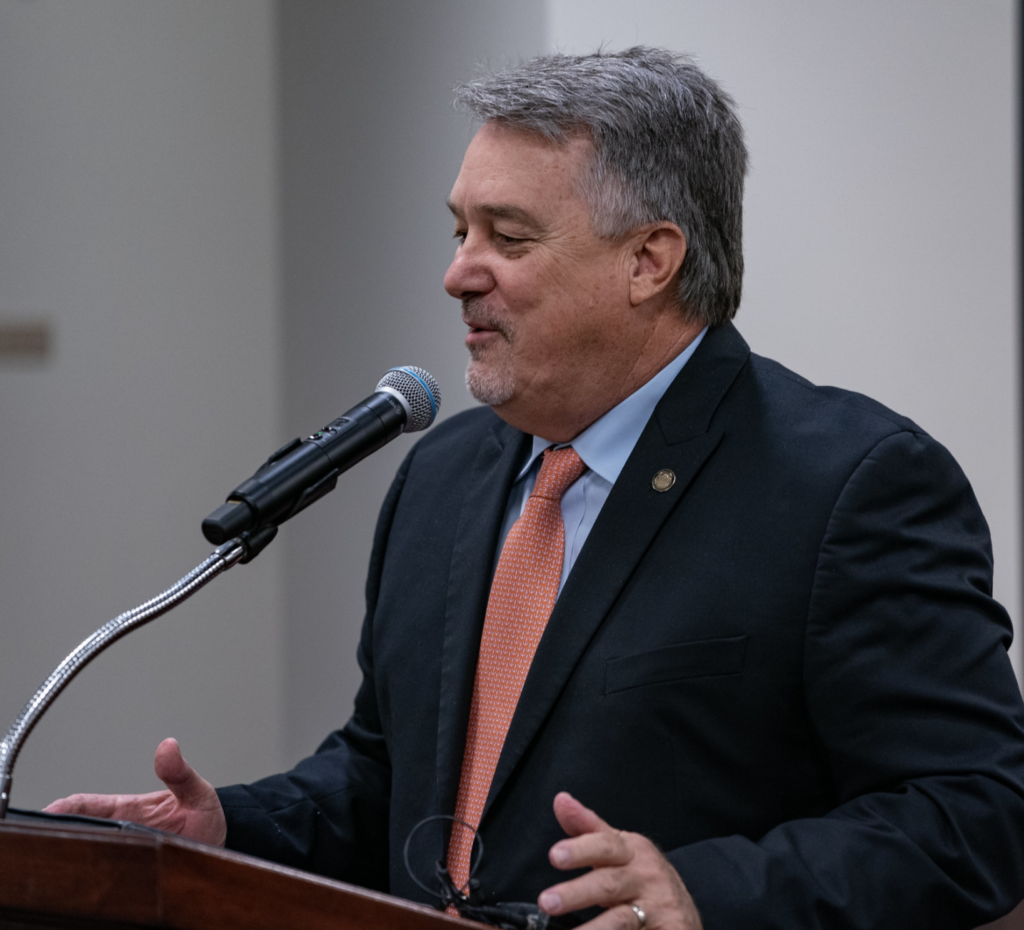Federal court hearing on redistricting case set for today

The entire political world in Alabama will be watching Monday to see what the court does with Alabama’s disputed redistricting case. A hearing is scheduled for Monday, August 14, in federal court at 9:00 a.m. CDT at the Hugo L. Black United States Courthouse in Birmingham. The hearing will focus on whether the map recently passed by the Alabama State Legislature complies with section two of the Voting Rights Act of 1965. Civil rights groups sued the state challenging the redistricting map that the Legislature passed in 2021. A three-judge panel of the Eleventh Circuit Court of Appeals in Atlanta ordered a halt to the 2022 election over concerns the map violated the 58-year-old Voting Rights Act. The U.S. Supreme Court intervened at the request of the state and allowed the election to proceed with the 2021 map. In June, the Supreme Court ruled in a 5 to 4 ruling that the congressional map likely violated the VRA and referred the case back to the three-judge panel. The Legislature was given until July 21 to submit a new map. The parties that sued the state and Alabama Democrats had wanted the Legislature to submit a map with two majority-minority districts. The Legislature, voting along party lines, refused and instead introduced and passed a controversial new map that simply increased Alabama’s Second Congressional District from 30% Black to 39.9%. That map kept the Gulf Coast, the Wiregrass, and Montgomery County whole; but was denounced by Democrats. The civil rights groups suing the state in federal court in Allen versus Milligan are asking the court to reject this new map. Members of the Alabama House Democratic Caucus, including House Minority Leader Anthony Daniels (D-Huntsville), will be outside the courtroom on Monday to issue their response following the conclusion of Monday’s hearing. Joining Daniels will be Caucus Chair Barbara Drummond (Mobile), Caucus Policy Chair Adline Clarke (Mobile), Caucus Secretary/ Treasurer Kelvin Lawrence (Hayneville), Rep. Patrice McClammy (Montgomery), Rep. Phillip Ensler (Montgomery), Rep. Chris England (Tuscaloosa), Rep. Patrick Sellers (Birmingham), Rep. Rolanda Hollis (Birmingham), Rep. Curtis Travis (Tuscaloosa), Rep. Napoleon Bracy (Mobile), Rep. Tashina Morris (Montgomery), Rep. A.J. McCampbell (Demopolis), and Rep. Sam Jones (Mobile) to comment on the court proceeding. “As we gather for the August 14th federal court hearing in Birmingham, Alabama, surrounded by the hallowed sites of the Civil Rights movement, we are reminded that this moment is inseparable from that struggle,” Daniels said. “We hope and pray that this court hearing, this next step, is a step forward on a continued path towards fair representation for all.” The Alabama House Democratic Caucus endorsed a redistricting plan, proposed by the Milligan and Caster plaintiffs, that would have created two majority Black congressional districts while respecting traditional redistricting guidelines. That map was rejected by the Republican supermajority and largely excluded from consideration during the legislative process. The major party primaries are on March 5, with candidate qualifying opening on October 16, so knowing where the congressional district lines are for that pending election is of some importance. To connect with the author of this story or to comment, email brandonmreporter@gmail.com.
Public meetings on congressional redistricting announced

On Wednesday, State Sen. Steve Livingston (R-Scottsboro) and State Rep. Chris Pringle (R-Mobile), who serve as the joint chairs of the Permanent Legislative Committee on Reapportionment, announced a series of meetings and deadlines on the looming congressional redistricting. The first meeting will be on June 27 at 1:30 P.M. in the Alabama State House Room 200. This will be a meeting of the Joint Committee and a public hearing. People unable to attend can watch the proceedings online at the Legislature’s website. July 7 at 5:00 P.M. is the deadline for all plans to be submitted to the Reapportionment Committee. You can contact the committee directly by email at: district@alsenate.gov. The committee will meet again and hold a public hearing on July 13 at 1:30 P.M. in State House Room 200. On August 14, there will be a hearing at Hugo L. Black United States Courthouse in Birmingham. The House members serving on the Permanent Legislative Committee on Reapportionment members include Cynthia Almond (R-Tuscaloosa); Barbara Boyd (D-Anniston); Jim Carns (R-Birmingham); Steve Clouse (R-Ozark); Corley Ellis (R-Columbiana); Chris England (D-Tuscaloosa; Laura Hall (D-Huntsville); Sam Jones (D-Mobile); Joe Lovvorn (R-Auburn); and Rex Reynolds (R-Huntsville). In 2022 a three-judge panel of the Eleventh Circuit Court of Appeals rejected Alabama’s 2021 congressional redistricting as being in violation of the Voting Rights Act of 1965—the U.S. Supreme Court, which earlier this month agreed. The three-judge panel has given the Legislature until the middle of next month to submit a new congressional redistricting plan to the federal court. The three-judge panel has ordered the Legislature to submit a new map with two majority-minority districts or something as close to that as possible. Alabama Governor Kay Ivey is expected to call a special session no later than July 17 to attempt to comply with the court order. If the Legislature cannot reach an agreement on a redistricting plan by July 21, or the Court does not like the State’s plan, then the three-judge panel may appoint a special master to draw the districts for the State. Republicans currently control six of Alabama’s congressional seats, while Democrats control only the Seventh Congressional District. None of the seven congressional races were competitive during last year’s general election. The redistricting could make two of those districts winnable for Alabama Democrats. It could also cost Democrats a seat if they make it too competitive. To connect with the author of this story or to comment, email brandonmreporter@gmail.com.
Nathaniel Ledbetter announces appointments to the Reapportionment Committee

On Tuesday, Speaker of the House Nathaniel Ledbetter announced that he had appointed a number of House members to serve on the Permanent Legislative Committee on Reapportionment. The House members appointed are: Cynthia Almond (R-Tuscaloosa) Barbara Boyd (D-Anniston) Jim Carns (R-Birmingham) Steve Clouse (R-Ozark) Corley Ellis (R-Columbiana) Chris England (D-Tuscaloosa) Laura Hall (D-Huntsville) Sam Jones (D-Mobile) Joe Lovvorn (R-Auburn) Chris Pringle (R-Mobile) Rex Reynolds (R-Huntsville). Since this is a joint committee, it is also made up of members of the Senate. The appointment of 11 members from the House would indicate an expansion of the committee. According to the committee website, the joint committee has just six members: Sens. Steve Livingston, Dan Roberts, and Bobby Singleton, and Reps. Kyle South, Laura Hall, and Chris Pringle. South is leaving the Legislature at the end of the month to accept a position as President and CEO of the West Alabama Chamber of Commerce. Presumably, the Senate will now appoint another eight joint committee members. The Joint Committee on Reapportionment normally redistricts the congressional districts, the state board of education districts, and legislative districts every ten years following the decennial census. In 2022 a three-judge panel of the Eleventh Circuit Court of Appeals rejected Alabama’s 2021 congressional redistricting as being in violation of the Voting Rights Act of 1965. Alabama appealed to the U.S. Supreme Court, which earlier this month found that the lower court was correct in its interpretation and has restored the lower court’s ruling that the state is in violation of the Voting Rights Act. The three-judge panel has given the Legislature until the middle of next month to submit a new congressional redistricting of the state to the federal court. The three-judge panel has ordered the Legislature to submit a new map where there are two majority-minority districts or something as close to that as possible. Alabama Governor Kay Ivey is expected to call a special session no later than July 17 to attempt to comply with the court order. If the Legislature cannot reach an agreement on a redistricting plan by July 21 or the Court does not like the State’s plan, then the three-judge panel may appoint a special master who will draw the districts for the state. Republicans currently control six of Alabama’s congressional seats, while Democrats control only the Seventh Congressional District. None of the seven congressional races were competitive in the general election last year. The redistricting could make two of those districts winnable for Alabama Democrats. To connect with the author of this story or to comment, email brandonmreporter@gmail.com.
Alabama lawmakers poised to cut sales tax on food in half

Alabama lawmakers are poised to remove half of the state’s sales tax on food, a move that some legislators and advocacy groups had sought for decades, but that gained bipartisan traction this year in the face of soaring food prices. The Senate Finance and Taxation Education Committee on Wednesday advanced House-passed legislation that would remove half of the state’s 4% sales tax on food. Lawmakers are aiming to give final approval to the bill on Thursday, one of the final two meeting days of the legislative session. Alabama is one of only three states that tax groceries at the same rate as other purchases. Republican Sen. Sam Jones, the sponsor of the Senate version of the bill, said the measure had gained support this year as the state sees a record budget surplus — partly driven by rising prices causing higher sales-tax collections — and consumer frustration over the cost of food. “Legislators are hearing from their constituents. Folks are feeling the pinch. They see what it’s taking for folks to put food on the table for their families. And that’s why you’ve got more momentum than ever, I believe,” Jones said. Some lawmakers have pushed for decades to remove the tax— which they said hurts low and moderate-income families — but the efforts failed because of the projected loss to education funding and a lack of political appetite for raising other taxes to offset the revenue loss. The advancing legislation calls for a gradual removal of half the tax. The House-passed bill would reduce the 4% tax on food to 3% on Sept. 1 and 2% on Sept. 1, 2025, provided that tax collections to the Education Trust Fund are projected to rise enough to offset the difference. The 4% tax provides more than $600 million annually to the state for education funding. Cutting it in half would cost the education budget an estimated $318 million annually. Jones said lawmakers are creating a study commission to explore the possibility of eventually removing all of the tax. He said that as people save money on grocery taxes, some will spend that money on other purchases and generate other sales tax revenue. The bill allows local governments to also remove the sales tax on food. Jones said counties are seeking the addition of language that would mirror the budget safeguards put in place for the state by linking the removal of the tax to budget growth. “I think everybody recognizes the political pressure to remove the sales tax on food. In many counties, the substantial portion of the sales tax revenue goes to local schools,” said Sonny Brasfield, executive director of the Association of County Commissions of Alabama. Republished with the permission of The Associated Press.
Bill to prevent China from buying Alabama real estate passes House

On Tuesday, the Alabama House of Representatives passed legislation that would forbid Chinese citizens, Chinese businesses and corporations, and the Chinese Communist Party and government from being able to purchase land and other real property in the state of Alabama. House Bill 379 (HB379) is sponsored by House Majority Leader Scott Stadthagen. Stadthagen said, “They are the biggest threat to us.” The synopsis states, “Under existing law, an alien, whether resident or nonresident, may own, hold, or dispose of real property with the same rights as a native citizen. This bill would prohibit Chinese citizens, the Chinese government, or Chinese entities from acquiring title to real property in the state.” State Representative Mary Moore said they were not a problem until Ronald Reagan. “When President Reagan started encouraging our companies to go overseas,” Moore said. “That accounts for a lot of poverty, especially in southern Alabama and eastern Alabama because they were clothing manufacturers.” “The problem is bigger than the state of Alabama,” Moore said. “President Reagan loved China, and they became a superpower.” Stadthagen explained that if his bill passes, “They can’t purchase property in Alabama.” Rep. Jamie Kiel said, “Your bill protects the state from the communist Chinese.” “My district was also impacted by the great sucking sound of jobs leaving the country that Ross Perot talked about, and that was under President [Bill] Clinton in 1994 with NAFTA,” Kiel said. “President [Barack] Obama said that the relationship between the U.S. and China was the most important bilateral relationship in the world.” “Whoever started it, it is time to stop it, and I appreciate the bill,” Kiel said. Rep. Tracy Estes said, “For those who may think that the Chinese are not the greatest threat to this country, don’t be fooled.” Rep. Napoleon Bracy asked, “What prompted this?” Stadthagen explained, “In the last year, the Chinese have purchased over six billion dollars’ worth of property.” “This is a protection bill,” Stadthagen said. “I know of several real estate contracts that are in progress.” Bracy asked, “What if they are already here?” “Then they are already here,” Stadthagen answered. “What if they wanted to expand?” Bracy asked. “Then they have to get a citizen or a dual citizen to purchase that property, and they can lease it from them,” Stadthagen answered. Bracy asked, “Could this hurt the economy?” Stadthagen said that it had not in the other states that have done this, but admitted, “This is something that is fairly new.” Stadthagen said, “The Department of Commerce wants to talk to me about it before it goes upstairs to the Senate.” Bracy said that a Chinese corporation had bought piston engine manufacturer Continental Motors. “Continental is in Mobile,” Bracy said. “Are they the enemy? They are providing jobs to our citizens. They are providing over 300 jobs.” “If Continental Motors decides to leave and those 300 jobs and their $75 million investment leaves with them, then we are impacting a lot more people than what this was designed to impact,” Bracy said. Rep. Tim Wadsworth expressed concerns that the way this was written would also apply to Taiwan. “Taiwan is not a part of it,” Stadthagen said. “About 90% of the semiconductor chips in this country are made in Taiwan,” Wadsworth said. “China and the U.S. actually consider Taiwan to be one country as part of the one-China policy.” Rep. Sam Jones said, “Continental Motors was a U.S. Company that sold out to China. They have been in Mobile for over 50 years.” Jones said he had been on several international job recruiting trips as the Mayor of Mobile. “We weren’t recruiting politics – we were recruiting jobs and companies,” Jones said. “Do I support the communism in China? No, I don’t, but we are a world economy.” Stadthagen said, “Do you know how many acres of land are owned by other countries? 1.4 million acres in Alabama are owned by foreign countries.” Jones said, “Alabama exports surged to over $25 billion last year. Our two largest trading partners are Germany and China.” “We don’t handle foreign policy,” Jones said. “That is not what we do here. You don’t know the facts because you have never spent any time recruiting industries.” “We watch Florida and pass everything that they do down there,” Jones said. “I am surprised that we have not passed anything about Mickey Mouse yet. We follow Florida, but we aren’t Florida.” Rep. Neil Rafferty asked about Chinese people that have moved here seeking asylum. “They can lease a house or property while they work on their citizenship,” Stadthagen answered. Rafferty asked, “Why don’t we do this for Vietnam or Laos? They are communist.” “They are not a threat to us,” Stadthagen answered. Rafferty asked, “What other countries would you do this with? “North Korea and Iran,” Stadthagen answered. Rep. John Rogers said, “The federal government is the one who ought to be pulling the trigger on China.” “If China were to stop exporting all the stuff they make for us, we would be in a world of hurt,” Rogers said. “This concerns me because it seems to single out one particular race. I like Chinese food.” Rogers asked, “If China called in our debt, can we pay it?” Stadthagen answered, “We can’t.” Rogers said, “Can you imagine if we had a war with China? We will have to draft you.” Rep. Barbara Drummond said, “I am here standing for Mobile. Brookley is in my district, so I have seen this business grow. I have seen Brookley take off. They are contributing to our local economy. They are contributing to the Alabama economy. I know China is a communist country, and I know how they treat women, and I don’t like that.” Drummond said, “Our Chamber has red-flagged this for us and said that this is going to hurt.” Rep. Ben Robbins offered an amendment addressing members’ concerns. The amendment exempted companies already operating in the state and Taiwan from the legislation. Stadthagen accepted the amendment as friendly, and it was adopted in a 100 to 0 vote. SB379 passed the House in a

